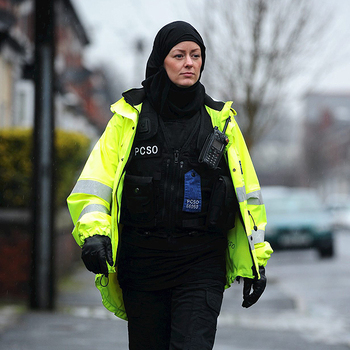Hawzah News Agency (London, UK) - Dame Louise Casey said she strongly opposed forcing people by law to remove veils, but explained that public bodies needed a "common sense" approach and that people and organisations should be able debate the issue openly.
As she published a major report today, she went on to argue that political leaders have ignored a series of "inconvenient truths" about integration and specifically about the way women are treated in some segregated Muslim communities.
Speaking to BBC Radio 4’s Today programme she said: "An awful lot of some elements of the British public, find women who are head to foot in clothing they see in places like Saudi Arabia, uncomfortable.
"I will die in the ditch for people in this country to wear whatever they want frankly, in their own homes and in their own livelihood. "Do I think that police officers or midwives, should be fully veiled? No I don’t.
"I want to see their faces, most of us do, [but] the very fact that we can almost not have that conversation, is part of what I’m saying here."
Dame Louise, brought in by David Cameron to report on social integration amid concerns young Britons were being radicalised, said she wanted to facilitate a debate about "inconvenient truths" and by doing so encourage a good government integration strategy.
Following a year-long study, she said there were areas which were struggling to cope with the pace and scale of change they faced as a result of immigration, while there were still large social and economic gaps between different ethnic groups.
She accepted that there is discrimination in society and in public bodies against people from ethnic minorities and women, but she said: "We have to be able to talk about the fact that if you are from a Pakistani heritage community in some areas of the north, you are less likely to speak English than your male counterparts, you’re less likely to be out getting a job and more likely to be in the home and not necessarily in my view by choice."
She said it was not women in those communities that she has "a problem" with, but the men.
She went on: "It is the misogyny and patriarchy that has to come to an end, and leaders that are not Muslim and are Muslim need to unite…no matter who you are, no matter what creed or colour you are, equality rules."
In a wide-ranging set of recommendations her review called for more English classes for isolated groups, greater mixing among young people through activities such as sport, and a new "oath of integration" enshrining British values for all holders of public office.
Mohammed Shafiq, chief executive of the Ramadhan Foundation, condemned the report as "inflammatory, divisive [and] pandering to the agenda of the far right". "We are saddened that once again British Muslims have become a political football which is bashed from time to time without any regard for the impact this has on individuals who then are subjected to threats and violence," he said.

